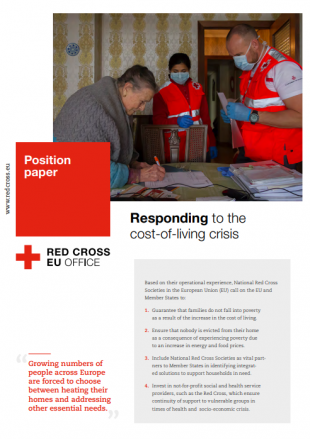Responding to the cost-of-living crisis
Eurostat estimates that by 2020 at least 36 million EU citizens were experiencing energy poverty, a figure that has undoubtedly risen since, due to COVID-19 and the Ukraine humanitarian crisis. Understanding energy poverty in its entirety requires that we understand the barriers that cause it – factors beyond the very real economic issues and the affordability of energy. The inability to secure energy or even adequate levels of energy and the impact on the benefits it brings to people’s lives are all important aspects to consider. The COVID-19 pandemic has served to further highlight the consequences of such a lack of investment and deepened the socio-economic scars that have prevailed in Europe over the last decade.
National Red Cross Societies in the EU have increased and adapted support to individuals and households experiencing poverty and hardship since the 2008 economic crisis. However, this ongoing support comes at a great cost as they struggle to ensure ongoing support to vulnerable people while trying to deal with increasing running and human resources costs. In many cases, a lack of support and recognition by their national authorities results in the scaling back of services.
Recommendations
National Red Cross Societies in the EU thus make the following recommendations to the EU and Member States towards protecting European households from further socio-economic hardship and to assist not-for-profit organisations in providing crucial support in meeting increasing critical needs of those at risk.
- The European Commission and Member States should guarantee that families do not fall into poverty as a result of the increase in the cost of living.
- Ensure that nobody is evicted from their home as a consequence of experiencing poverty due to an increase in energy and food prices.
- Include National Red Cross Societies as a vital partner to Member States in identifying integrated solutions to support to households in need.
- Invest in not-for-profit social and health service providers, such as the Red Cross, who ensure continuity of support to vulnerable groups at times of health and socio-economic crises.


